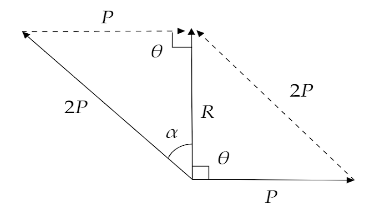Question
Question: If the resultant of two forces of magnitude \(P\) and \(2P\) is perpendicular to \(P\), then the ang...
If the resultant of two forces of magnitude P and 2P is perpendicular to P, then the angle between the forces is
A. 32π
B. 43π
C. 54π
D. 65π
Solution
It is given in the above question that the resultant of the magnitude of two forces is perpendicular to P. So, by using the triangle law of vector addition, we have to draw the diagram. And then, by using trigonometric formulas, we will find the answer.
Complete step by step answer:
According to the given question, by using parallelogram law of vector addition we find the diagram as,

Let the resultant of the forces be R. As per the given question the angle between the resultant force R and P is θ=90∘.Now from the triangle to the left side of the figure we get,
sinα=2PP
Eliminating P from right side we get,
sinα=21−−−−(1)
From the value of trigonometric identities we know, sin30∘=21−−−−−(2)
So, by comparing equation (1) with respect to equation (2) we get,
α=30∘
Therefore, the angle between P and 2P is,
(α+θ)=90∘+30∘=120∘
Hence, the angle between the two forces is found to be 120∘.Now, 120∘ in the form of radian system is 32π.
So, the correct option is A.
Additional information: The magnitude of resultant of two vectors P and Q is given as R=P2+Q2+2PQcosθ where θ is the angle between the two vectors P and Q.
Note: It must be noted that we can also use the triangle law of vector addition to find the solution to this particular problem. In order to convert a degree system to a radian system we use the unitary method and the value of π is considered to be 180∘.
